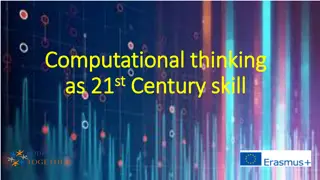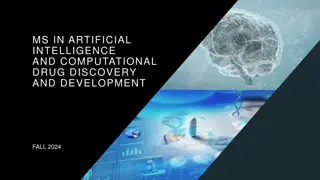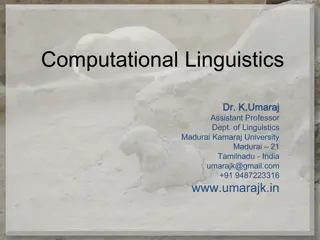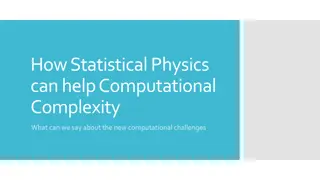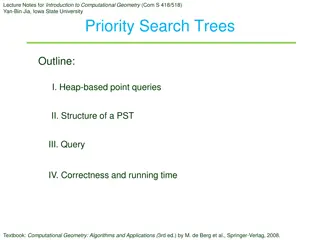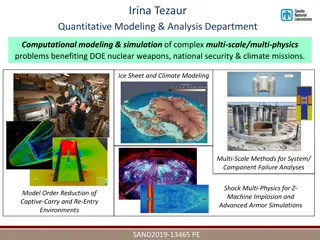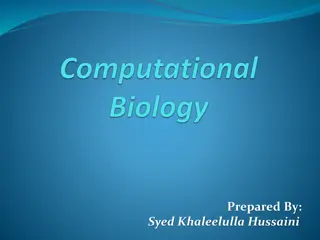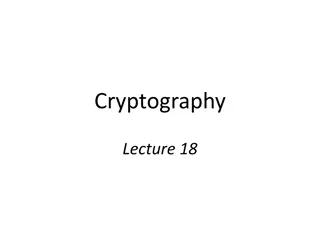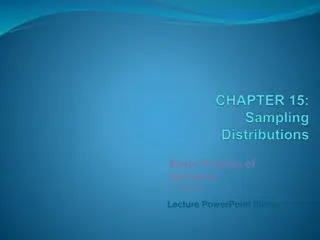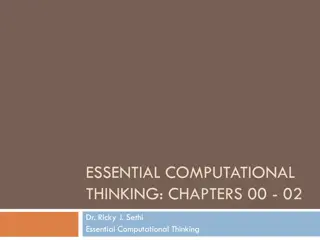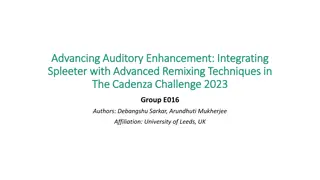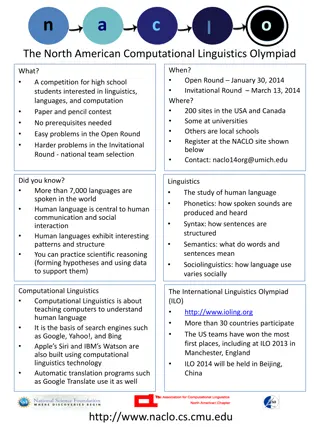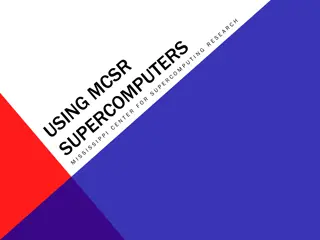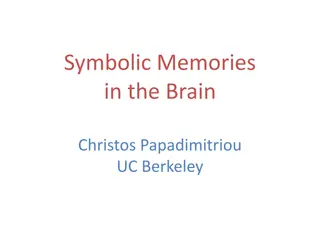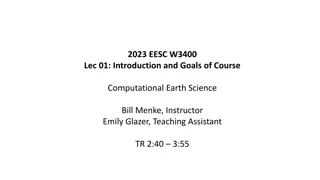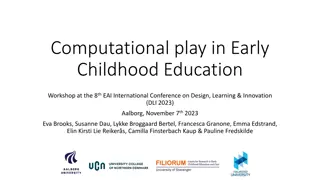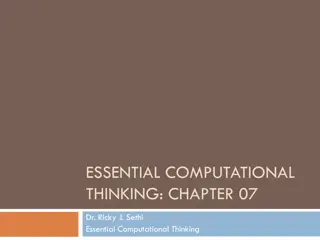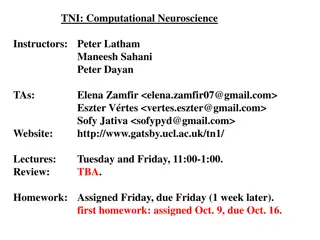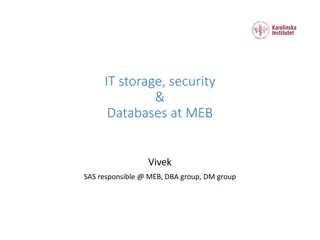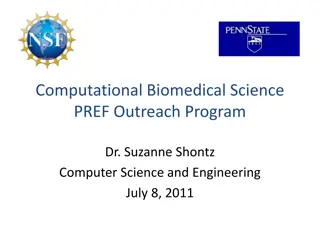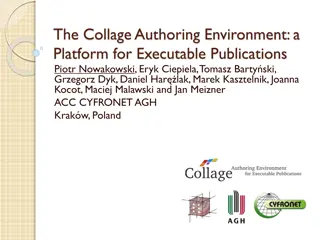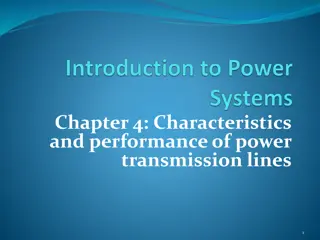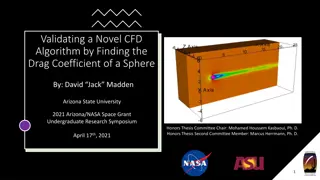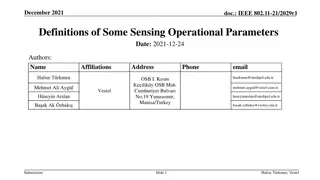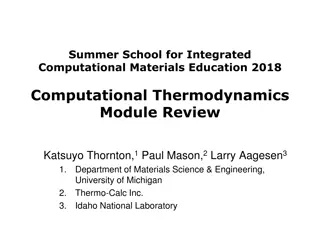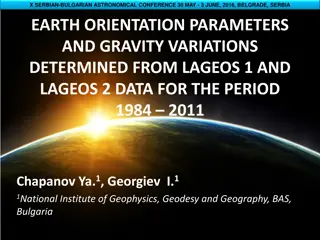Computational thinking as 21st Century skill
Computational thinking is a critical skill for the digital age, involving problem-solving techniques that enable computers to process information effectively. It precedes programming and requires breaking down complex problems into manageable steps. Educators emphasize computational thinking exercis
10 views • 4 slides
Master's Program in Computational Drug Discovery and Development - Fall 2024 Curriculum
This Master's program offers a comprehensive curriculum focusing on Artificial Intelligence, Computational Drug Discovery, and Development. With a blend of cutting-edge technologies and practical applications, students delve into techniques, AI/ML, big data mining, modeling, and more. Through intens
21 views • 7 slides
Computational Linguistics and Natural Language Processing
Explore the fascinating fields of Computational Linguistics and Natural Language Processing (NLP), delving into their development, applications, and significance. Learn about the study of human languages in computational models, the importance of corpora in linguistic research, and the various types
5 views • 33 slides
Computational Complexity Through Statistical Physics
In the age of vast data growth, tackling complex computational problems is crucial. Statistical physics can provide insights into handling the new challenges arising from the exponential increase in data. As we delve into understanding the complexity of computational tasks, it becomes evident that e
4 views • 24 slides
Introduction to Priority Search Trees in Computational Geometry
This lecture outlines the structure and query process of Priority Search Trees (PST) in computational geometry. It covers heap-based point queries, range trees for windowing queries, handling query ranges in 1D and 2D spaces, and using heaps to efficiently handle query ranges. The content discusses
4 views • 18 slides
Advancing Computational Modeling for National Security and Climate Missions
Irina Tezaur leads the Quantitative Modeling & Analysis Department, focusing on computational modeling and simulation of complex multi-scale, multi-physics problems. Her work benefits DOE nuclear weapons, national security, and climate missions. By employing innovative techniques like model order re
4 views • 6 slides
Computational Biology: Proteins, DNA, RNA, Genetics, and Evolution
Computational Biology combines computational methods with molecular biology to solve biological problems. Explore topics like proteins, DNA, RNA, and genetics, learning about amino acids, nucleotides, and the genetic code. Understand the evolutionary processes of mutation and natural selection.
4 views • 21 slides
Biomarkers and Maturity Parameters in Petroleum Exploration
Biomarkers and maturity parameters play crucial roles in characterizing source materials and assessing the thermal maturity of organic matter in petroleum exploration. Specific biomarkers and non-biomarker maturity parameters are utilized to determine the relative maturity of source rocks and oils.
1 views • 17 slides
Introduction to Computational Number Theory in Cryptography
Practical private-key cryptography can be done without advanced math, but understanding computational number theory is essential for public-key encryption. This field focuses on the computational difficulty of problems, analyzing algorithms' running times, classifying problems as easy or hard based
3 views • 27 slides
Parameters, Statistics, and Statistical Estimation in Statistics
In statistics, we differentiate between parameters and statistics, where parameters describe populations and statistics describe samples. Statistical estimation involves drawing conclusions about populations based on sample data. The Law of Large Numbers explains the relationship between sample stat
6 views • 12 slides
The Essence of Computer Science and Computational Thinking
Delve into the fundamentals of Computer Science and Computational Thinking through chapters discussing the nature of science, predictions in physics, and the distinction between Computer Science and Computer Information Systems. Explore the relationships between Math, Physics, and Computer Science i
4 views • 29 slides
Advancing Auditory Enhancement: Integrating Spleeter with Advanced Remixing Techniques in The Cadenza Challenge 2023
Our project for The Cadenza Challenge 2023 focused on improving audio for headphone users with hearing loss by integrating Spleeter's deep learning capabilities. We utilized N-ALR prescriptions, Butterworth bandpass filters, and Dynamic Range Compression to enhance audio quality. By leveraging advan
0 views • 19 slides
North American Computational Linguistics Olympiad: A Competition for High School Students
The North American Computational Linguistics Olympiad (NACLO) is a competition for high school students interested in linguistics, languages, and computation. It consists of an Open Round in January and an Invitational Round in March, with no prerequisites needed. Participants tackle easy problems i
15 views • 4 slides
Mississippi Center for Supercomputing Research (MCSR) Overview
The Mississippi Center for Supercomputing Research (MCSR) supports computational research in various fields like Chemistry, Bioinformatics, Physics, Engineering, and Computer Science for Mississippi IHLs. They provide training to optimize computational resources, offer classes for computational trai
6 views • 23 slides
Computational Theories of Brain Function
In this series of images and text snippets, the discussion revolves around the emerging field of computational theories of brain function. Various aspects such as symbolic memories, the relationship between the brain and computation, the emergence of the mind from the brain, and computational thinki
4 views • 53 slides
Computational Earth Science Course Overview
Explore the world of Computational Earth Science with Bill Menke as the instructor and Emily Glazer as the teaching assistant. The course aims to help you become proficient in applying Python-based computational methods to understand dynamic Earth Science phenomena. Through modeling, you will gain i
4 views • 34 slides
Computational Play in Early Childhood Education: DLI 2023 Workshop
The workshop at the 8th EAI International Conference on Design, Learning & Innovation (DLI 2023) in Aalborg aims to delve into the application of computational play with mathematics in early childhood education. Through live sessions and discussions, opportunities and challenges in utilizing computa
19 views • 7 slides
ESSENTIAL COMPUTATIONAL
In Chapter 7 of "Essential Computational Thinking" by Dr. Ricky J. Sethi, dive into procedural programming concepts like sequence, selection, and iteration to craft computational solutions. Explore how engineers approach problem-solving in software development, emphasizing efficiency and abstraction
3 views • 27 slides
Neuroscience at UCL: Computational Brain Insights
Delve into the world of computational neuroscience with instructors Peter Latham, Maneesh Sahani, and Peter Dayan at University College London. Explore the brain's intricacies, from basic facts to mathematical foundations, and uncover the hidden complexities of neural processes. Engage in lectures,
3 views • 98 slides
IT storage, security & Databases at MEB
Responsible for managing data storage, security, and databases at MEB Vivek SAS. The role involves overseeing various server setups, computational servers, home and scratch disk management, and providing access to applications and SQL servers. Additionally, managing computational servers at MEB requ
0 views • 13 slides
Computational Biomedical Science Outreach Program - Overview
Delve into the intersection of computational science and biomedical engineering through the Computational Biomedical Science Outreach Program led by Dr. Suzanne Shontz. Explore the application of computational tools in treating conditions like deep vein thrombosis and hydrocephalus. Learn about the
3 views • 29 slides
Platform for Executable Publications in Modern Computational Science
Computational science faces challenges in publishing large data volumes and complex algorithms. The Collage Authoring Environment offers a solution for validating and sharing executable content within research papers, addressing issues of trust and verifiability in scientific publications. This plat
3 views • 19 slides
Computational Models for Tuberculosis Diagnosis: A Review
This systematic review examines computational models for diagnosing tuberculosis, highlighting strengths, weaknesses, and areas for improvement. The research aims to enhance TB diagnostic accuracy through advanced computational systems.
2 views • 19 slides
Computational geometry introduction
Dive into the fundamentals of computational geometry with this introduction by Rugaia Omer Ahmed. Explore key concepts, algorithms, and applications in the field. Gain insights into geometric computations and problem-solving techniques. Enhance your understanding of spatial data structures and geome
3 views • 15 slides
Mastering Computational Geometry: Problem-Solving Strategies
Explore the world of computational geometry through practical problems like finding the closest pair of points in a 2D plane. Delve into the divide and conquer approach to efficiently solve complex geometric challenges. Uncover insights on organizing points, sorting by x-values, and handling proximi
10 views • 25 slides
Characteristics and Performance of Power Transmission Lines
Transmission lines are crucial components in power systems that require a deep understanding of their characteristics and performance. The analysis is often done on a per-phase basis using two-port network representations with A, B, C, and D parameters. These parameters, which depend on line paramet
5 views • 38 slides
SOA Surrogate Species Parameters Analysis
This data provides parameters for various surrogate species used in the May 2015 version of UCI-CIT, including vapor pressure, UNIFAC parameters, Henry's Law constants, and more. The parameters are calculated using various methodologies such as SIMPOL 1, UNIFAC, and Suzuki HLC. Detailed values for s
0 views • 14 slides
Java Method Parameters
Learn about passing parameters in Java methods, including implicit and explicit parameters, formal parameters, and actual parameters. Understand the relationship between formal and actual parameters and how values are passed during method calls. Explore the concept of parameter passing and its impli
2 views • 31 slides
Validating a Novel CFD Algorithm: Drag Coefficient of Sphere at ASU
A study presenting the validation of a novel Computational Fluid Dynamics (CFD) algorithm developed by the Kasbaoui Research Group at Arizona State University. The research focuses on testing the algorithm in three dimensions and determining simulation parameters for accurate hydrodynamic force comp
0 views • 16 slides
Analyzing Statistics and Parameters
In this section on Statistics and Parameters, learn about statistical inference, sample statistics, population parameters, and measures of central tendency and variation. Understand how statistics are used to draw conclusions about populations and differentiate between sample statistics and populati
2 views • 19 slides
TSG-RAN WG4 Meeting Recap on Antenna Parameters
During the TSG-RAN WG4 Meeting #94-e-Bis, discussions focused on antenna parameters for different scenarios and frequency ranges. Agreements were reached on wide area coverage and additional parameters for AAS antennas. Detailed analysis was presented on elements, beamwidth, gain, and configurations
4 views • 5 slides
Two-Port Network Parameters and Conversions
Delve into the realm of two-port network parameters including impedance, admittance, a-parameters, b-parameters, h-parameters, g-parameters, and parameter conversions. Explore the definitions, complexities, and applications of these network parameters for low-frequency circuits, transmission, and ca
2 views • 46 slides
IEEE 802.11-21/2029r1 Sensing Operational Parameters Definitions
This document discusses the definitions of sensing operational parameters in IEEE 802.11-21/2029r1, focusing on negotiation processes, performance adjustments, and predefined parameters for popular use-cases. It emphasizes the importance of defining specific parameters to meet the varied requirement
0 views • 23 slides
Computational Thermodynamics Module Review - Summer School 2018
Explore the Computational Thermodynamics Module at the Summer School for Integrated Computational Materials Education in 2018. Dive deep into thermodynamic concepts, phase equilibrium, and the application of computational tools in real-world engineering problems. Gain insights into Gibbs Free Energy
3 views • 14 slides
Earth Orientation Parameters and Gravity Variations from LAGEOS Data
Explore the findings presented at the Serbian-Bulgarian Astronomical Conference in 2016, showcasing the determination of Earth orientation parameters and gravity variations using data from LAGEOS 1 and LAGEOS 2 spanning the period of 1984 to 2011. The conference discussed the processing of Satellite
2 views • 13 slides
CompactLight Injector Design Philosophy and Simulation Parameters
The project discusses the design philosophy and simulation parameters of a CompactLight injector using S-band gun and X-band booster for acceleration. It covers RF parameters, laser parameters, and requirements for CompactLight, with detailed case studies on acceleration and velocity bunching. The r
1 views • 40 slides
Enhancing Computational Thinking Across Diverse Disciplines
Explore the integration of computational thinking across various academic fields to frame questions, solve problems, and gain new insights. Learn what computational thinking entails, its importance, and how it differs from computer literacy. Discover the benefits of making computational thinking exp
1 views • 15 slides
Efficient Sorting Techniques for Table Parameters Optimization
Discover effective methods for sorting tables by parameters not available in the column, such as using other part parameters or system parameters. Learn how to improve organization and accessibility in your data management processes. Explore alternative options using user-defined parameters like par
3 views • 9 slides
CEPC Heating in IR Region of MDI Workshop Summary
Explore the key aspects of CEPC's Heating in the IR Region of MDI workshop, including beam parameters, vacuum chamber structure, and impedance results. Gain insights into CDR and high luminosity Z (2T) for CEPC, with detailed parameters and layout information. Discover the comprehensive list of para
1 views • 22 slides
Male Rat Urine and Plasma Parameters
Explore the urine and plasma parameters of male SSWT rats infused with ANP or vehicle after a 21-day HS challenge. The data includes body weight, urinary flow, electrolyte levels, plasma sodium, chloride, potassium, calcium, and creatinine measurements. Additionally, compare the parameters between S
0 views • 4 slides
